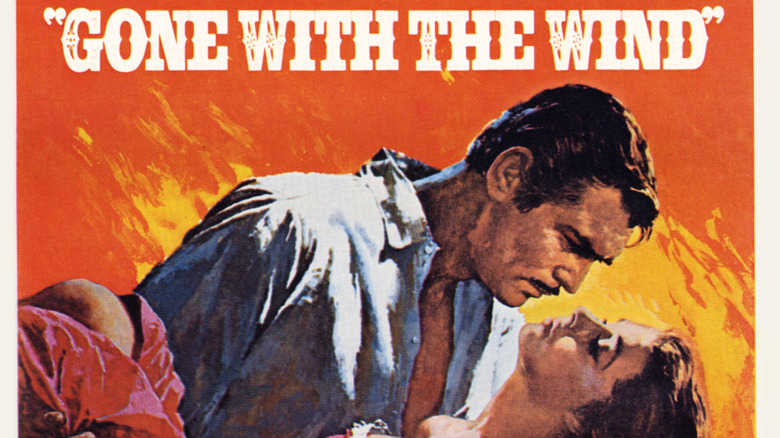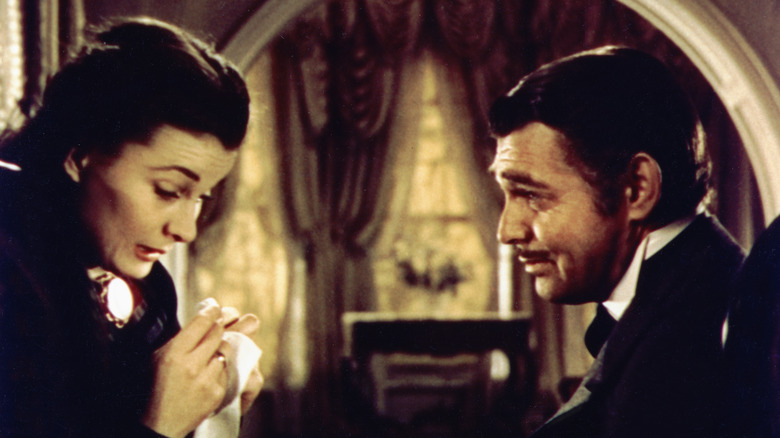The Iconic Line In Gone With The Wind That Resulted In A $5,000 Fine
Though it's looked at these days through the lens of modern ideas, there's no denying that "Gone With The Wind," the 1939 film based on Margaret Mitchell's 1936 novel of the same name, is one of the crowning achievements of its day in cinema. The film won eight Academy Awards, according to the Academy's website, including the first best picture awarded to a color film. It also represented high points in the careers of its two main leads, Vivien Leigh and Clark Gable.
The film was and is very much a product of its time, however. Its attitudes towards race and slavery, as presented on the screen, are certainly unacceptable today. Further still, for a historical epic that takes place during a war, it contains little violence; and though a plot point relies on its heroine, Scarlett O'Hara, giving birth, sex isn't even hinted at. The film also contains exactly one profanity, a word so mild that it's likely that today's schoolchildren could get away with saying it on the playground. However, in its day it was downright scandalous, and it cost the filmmakers a hefty fine.
The Dreaded Hays Code
The government of the United States is, by and large, not in the business of censoring movies, save for such things as making sure children aren't sexually exploited, no one is harmed, and so on. Instead, the industry largely censors itself via the Motion Picture Association of America (MPAA). As the Center for Media Literacy notes, having the industry censor itself means that the government doesn't have to. Unfortunately, that has led to accusations that the organization stifles creativity and, through its rating system, effectively forces filmmakers to produce films that fall into its theater-friendly ratings (G, PG-13, PG, and R) lest it get a rating (such as NC-17) that theaters will refuse to show.
In the days of "Gone With The Wind," things were considerably worse, and the industry's guidelines — sometimes colloquially called "The Hays Code," according to the Australian Centre for the Moving Image – prevented just about everything that you'll see in a PG-13 movie today, including profanity, even suggestions of sex, and other things that the modern industry sells without a second thought.
It was a profanity — an exceptionally mild one, to be sure — that ran the producers of "Gone With The Wind" afoul of the Hays Code. And, they chose to simply pay a fine, for the sake of artistic integrity, rather than change it.
'Frankly My Dear, I Don't Give A Damn'
At the end of "Gone With The Wind," Clark Gable's character, Rhett Butler, is utterly fed-up with the histrionics of Vivien Leigh's character, Scarlett O'Hara (there's more to the story, but this will have to do for now). And, when she asks what's to become of her without him in his life, he responds with the famous quip, "Frankly my dear, I don't give a damn," per The Independent.
It's a mild bit of snark, punctuated by a PG-13 cuss word, that wouldn't raise an eyebrow today. But, in 1939, it was downright scandalous, and the producers knew that they were going to run afoul of the Hays Code if they included the line. According to The Independent, there was, indeed, a script that had the much-more anodyne line, "Frankly my dear, I just don't care," but instead, producer David O. Selznick chose to keep the line. Nevertheless, the film was approved for distribution in theaters, according to History, but the producers had to pay a fine of $5,000 (about $100,000 in 2022 dollars, per Inflation Calculator) for the naughty word. Four decades later, according to Fatherly, 1976's "The Bad News Bears" would feature children letting loose with every blue expletive in the dictionary, and probably some that weren't; an example of how much attitudes changed over the course of just under half a century.


